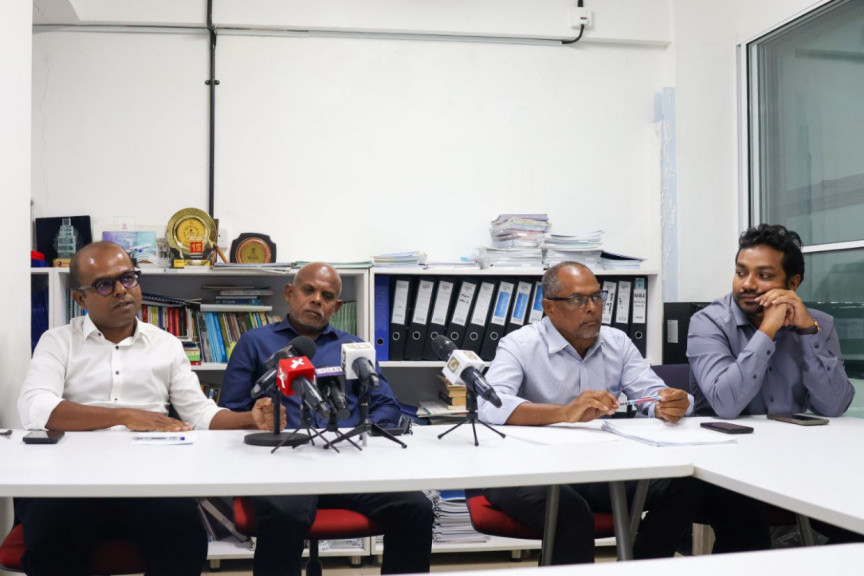
Veteran journalists speak at a press conference held to protest against the Media bill in parliament on August 26, 2025. (Sun Photo/Mohamed Maniu)
A controversial bill allowing government control over media is being labeled as ill-intentioned and a severe threat to freedom of the press and expression in the Maldives, potentially setting it back two decades, according to veteran journalists.
The Maldives Media and Broadcasting Regulation Bill was introduced by Abdul Hannan Abubakr, an Independent Member of Parliament affiliated with the government.
During a press conference held Tuesday to advocate for the bill's withdrawal, Ahmed Zahir (Hiriga Zahir), Managing Editor of Dhauru news and a journalist with over 30 years of experience, stated that the bill would undermine nearly 20 years of democratic governance by eroding press freedom in the Maldives. Hiriga also claimed that certain provisions in the bill are designed to impose criminal penalties on journalists, leading to direct imprisonment.

Moosa Latheef, Chief Editor of Dhauru news, who has worked in journalism for almost 40 years, highlighted a significant threat: three of the seven members of the media regulatory commission would be presidential appointees. He argued that if a state media were among the remaining four elected by the media, it would effectively allow the government to control newspapers.
Moosa also addressed remarks by Deputy Speaker of Parliament and Dhiggaru MP Ahmed Nazim, who claimed to have studied the bill and stated it incorporated provisions from media laws of various foreign countries. Moosa countered that the bill was based on provisions from countries lacking press freedom, such as Malaysia.

“In other words, this is a big mess. Hidden behind it is the government's desire to control the existing independent media,” said Moosa, who previously served as Editor at Haveeru, a longest serving news agency in the Maldives.
At the same press conference, Hussain Fiyaz Moosa, Chief Editor and CEO of Adhadhu news, described the bill as an "ill-intended and cunning idea." He asserted that despite claims from government MPs that the bill was drafted based on best practices, its true intent was to place media and newspapers under the authority of President Dr Mohamed Muizzu.
Fiyaz noted that the current Media Council framework in the Maldives is designed for media accountability and it has taken action against media outlets in the past. He argued that the bill's power to withhold licenses for newspapers, magazines, and channels contradicts constitutional rights and rules.

Questioning the legality of taking action against media personnel while a case is pending, Fiyaz, who previously worked for Haveeru, Aafathis, and RaajjeTV, challenged how any action could be taken against a media outlet or journalist before anyone is proven guilty of breaking a law.
He concluded that there was no need to discuss the bill, as journalists' views on it were clear. "It's a worse bill than that. It doesn't warrant a sit-down or debate at all," he stated.
Criticizing Abdul Hannan, the bill's introducer, Fiyaz claimed that Hannan's only endeavor in his 18 months at the 20th parliament had been to attempt to control the media. “This is not done with his (Hannan's) intention, this is done directly under the President through the PNC,” he added.
Hannan had previously introduced a similar media regulation bill, which was rejected. The ruling PNC, holding a supermajority in parliament, has now expressed support for the current bill.
Earlier, government spokesperson Heena Waleed asserted that the bill would ensure media freedom and empower the media. However, the President stated on Monday evening that he had informed PNC members that he did not wish to pass the bill in a manner that would grant him control over the media.
If Hannan's Media Bill is enacted, individual journalists could face fines ranging from MVR 5,000 to MVR 25,000, while media outlets would be fined MVR 100,000. Furthermore, the commission would gain the power to cancel the registration of media outlets and halt newspaper operations even before a case is fully investigated.
Consequently, both the Maldives Media Council and the Maldives Journalists Association (MJA) have called for the law's withdrawal.
Although introduced by an independent MP who had previously proposed a similar bill, opposition and media organizations contend that the government is the true force behind the legislation.